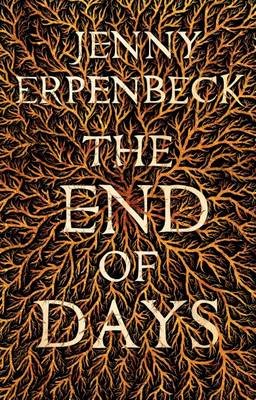 Jenny Erpenbeck, The End of Days (2012)
Jenny Erpenbeck, The End of Days (2012)
Translated from the German by Susan Bernofsky (2014)
I’ve come across several novels on this year’s IFFP longlist which examine the twentieth century through the lives of ‘ordinary’ individuals, but this may be the sharpest one yet. The protagonist of The End of Days is born in the Austrian Empire at the start of the century; each of the novel’s five ‘books’ imagines that she died at a different point in her life; the short ‘intermezzo’ sections between them run through all the small differences – walking down this street instead of that; a window left open to let the air in – that could have kept her alive.
The first thing to say is that Susan Bernofsky’s translation is very potent indeed. When I read the first page, in which the protagonist is buried as a baby, it was so powerful that I almost had to put the book down (something that rarely happens to me): as handfuls of earth are thrown into the child’s grave, each is described as covering the girl or woman who might have been. The rest of this first section is full of tiny but resonant details, like the toy whose bells make the same jingling noise they did the day before, although so very much has changed. The protagonist’s death at such a young age is presented as a hole in reality for her family, beside which all else becomes insignificant.
The structure Erpenbeck has used enables effects like this. In The End of Days, ‘history’ in the broad sense doesn’t change; it is the individual’s interaction with history that changes. In each iteration of the protagonist’s life, her death means something different: in one section, she joins the Communist Party and moves to the Soviet Union, but dies labouring in the gulag; in another, she escapes internment and dies thirty years later, a celebrated writer and Party member; in the last, she lives to be ninety, and is one resident among many in an old people’s home. Erpenbeck’s novel intertwines the personal with the grand sweep of history to great effect, underlining the importance of both. I would certainly expect to see The End of Days on the IFFP shortlist; for me, it’s potentially a winner.

Tomás González, In the Beginning Was the Sea (1983)
Translated from the Spanish by Frank Wynne (2014)
One of the interesting things about the IFFP (or, if you prefer, something that points to just how much literature from other languages remains untranslated into English) is that we’ll see the odd book which was originally written much earlier than the translation. Such is the case with In the Beginning Was the Sea, the first novel by Colombian writer González, and his first to appear in English, some thirty years on. I actually read this last year, but didn’t review it at the time, because I didn’t particularly care for it. Looking back, I think I was thrown by what the publicity material said about the book’s inspiration (which, for that reason, I won’t reveal here).
This is the story of Elena and J., a couple of intellectuals who leave behind city life to begin a new life by the sea. But money problems mean that they are going to have to earn a living from their land, and it’s not going to be plain sailing. There are hints (and increasingly clearer indications) that all is not going to end well; the novel becomes a chronicle of ill fortune, with a claustrophobic air of dread created by Frank Wynne’s translation. We know that something is coming, but not precisely what – and, for all the foreshadowing, González doesn’t make it feel too staged. I appreciated In the Beginning Was the Sea more the second time around, though I don’t anticipate that it would necessarily make my shortlist.
Read my other posts on the 2015 Independent Foreign Fiction Prize here.
Like this:
Like Loading...




Recent Comments